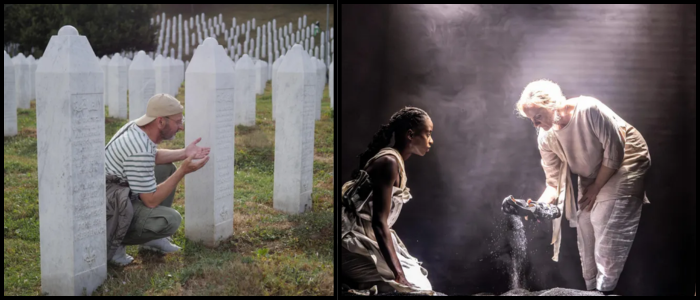The Srebrenica massacre, in which around 8,000 people – mostly Muslim men and boys – were killed, is the worst such atrocity in Europe since World War Two. They had been among thousands who fled to Srebrenica, thinking they would be safe from attack under the United Nations. But instead, Bosnian-Serb forces commanded by General Ratko Mladić split up families, sending women and children in one direction and shooting the rest.
Victims were interred in mass graves, only to be re-buried in other sites in an effort to cover up the crime. That has left many families still looking for remains after standing in lines, occasionally making identification through DNA, clothing or personal items, just as the moments are depicted in the play.
Denial, Division, and Delayed Healing
Despite Mladić and political chief Radovan Karadžić being found guilty of genocide by an international court, denial of the massacre is, however, still widespread. Bosnian Serb political leaders in Republika Srpska, the Serb-majority region of Bosnia and Herzegovina, still commonly deny the use of the word "genocide". Although the show received a standing ovation in Sarajevo, in Republika Srpska, things are different.
The lead actress, Selma Alispahić, a former war refugee, expressed disappointment. "I thought when 30 years came that we would come to our senses," she said. "People get tired of proving the truth that's already proven."
Critics of the country's present political system, which was established by the Dayton Peace Agreement, argue that Bosnia and Herzegovina was divided into two principal entities by the agreement — one that is largely Bosniak and Croat, and one Serb. Although there exists a state-level government, the majority of power remains with these entities.
In Republika Srpska, its president, Milorad Dodik, has defied state institutions and refused to recognise decisions by the international High Representative. He was sentenced to a year in prison and a six-year ban from office for defying such rulings earlier this year, though he is appealing the conviction.
Recent developments, including proposed legislation for a "reserve police force," have raised alarm. The international High Representative, Christian Schmidt, had sounded the alarm, comparing the rhetoric to that of the 1990s. He urged bolstering the foreign peacekeeping force to maintain stability.
Memory, Mourning and a Disturbing Future
In Sarajevo, the preparations for the anniversary of the massacre loom large. Mourners lined the streets in the rain to pay their respects to a convoy carrying the remains of seven recently identified victims, to be buried at Potočari Cemetery near the former UN base. Public screens showed messages calling on the public to "Remember Srebrenica."
Yet just a short distance across the bridge in East Sarajevo, part of Republika Srpska, there is no sign of commemoration. There, government officials rarely display interest in the memorials. Saša Košarac, a senior minister and member of Dodik's party, said that such a spotlight on Bosniak victims disrupted reconciliation. He stressed that there were crimes on all sides during the war.
At the same time, millions of citizens are deeply bonded in solidarity. Bikers, runners and cyclists had travelled from all over the country to visit the Memorial Centre and Potočari Cemetery to pay respects to the dead. Mirela Osmanović, who was born two years after the massacre, in which she lost two of her brothers, works at the Memorial Centre and says this support is crucial.
But she also expressed concern. "We are really worried about our future," she said, adding, "The atmosphere created by Republika Srpska's leaders is quite nerve-wracking." Her parents have also had the same experience: No one even came within a couple of meters of each other, even though the situation in most places here is like the early 1990s before the war began.
For many in Srebrenica, unprocessed mourning and lingering political tensions make healing all the more difficult. Even while some political actors use division to hold onto their power, the people struggle for peace, for memory, for a life without fear.
World

Srebrenica Massacre's Legacy Still Divides Bosnia

The silence is shattered with a scream on stage at Sarajevo's War Theatre as actors dramatise a moment of tragedy — here, people using their hands to dig through earth and yielding a watch, a sandal. This haunting image comes from Flowers of Srebrenica, a play that resurrects the agony of July 1995 and the ongoing pain that the country still grapples with.















